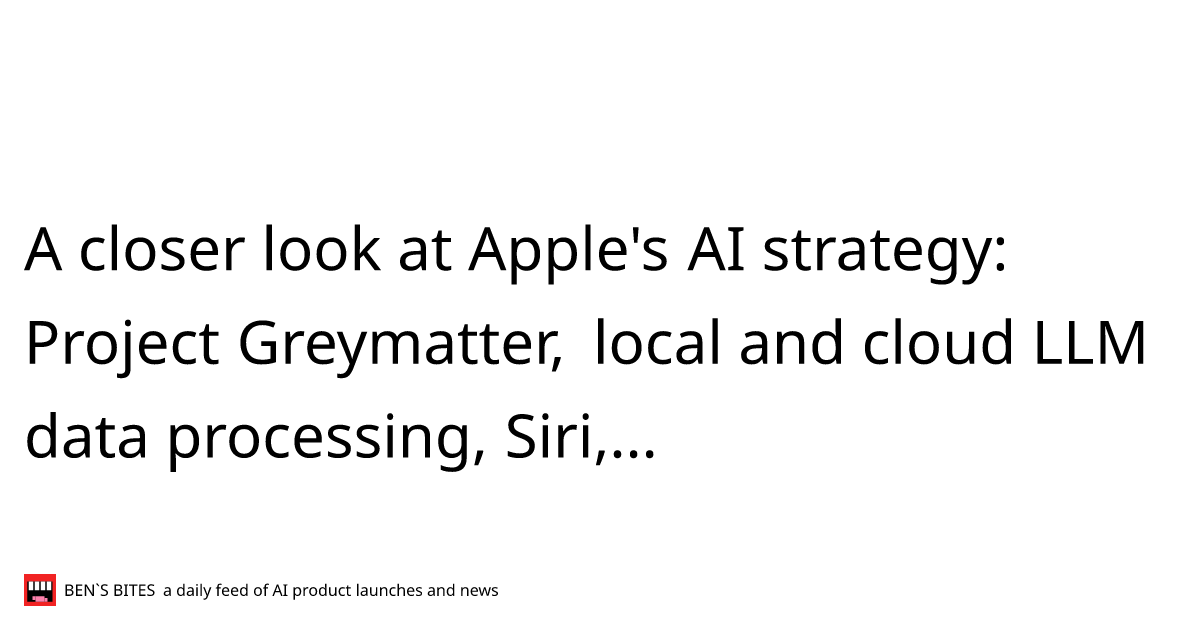Apple's LLM Siri: A Comeback Strategy?

Table of Contents
The Current State of Siri: Identifying Weaknesses and Opportunities
Siri's Past Shortcomings
Siri's past performance has been marked by several limitations compared to its competitors. These shortcomings have contributed to its perceived lack of sophistication and user satisfaction. Some key weaknesses include:
- Lack of Contextual Understanding: Siri often struggles to understand the context of a conversation, leading to inaccurate or irrelevant responses.
- Inconsistent Responses: Users have reported inconsistencies in Siri's responses to the same query, highlighting issues with its underlying algorithms.
- Limited Integration with Third-Party Apps: Compared to Google Assistant and Alexa, Siri's integration with other apps and services remains relatively limited, reducing its overall functionality.
- Dependence on Internet Connectivity: Many Siri features require a constant internet connection, rendering it less useful in areas with poor connectivity.
- Privacy Concerns: While Apple has emphasized privacy, some users remain concerned about the data collected by Siri and its potential use.
LLMs as a Solution
The integration of LLMs offers a potential solution to many of Siri's historical weaknesses. LLMs are designed to understand and generate human-like text, offering several key advantages:
- Improved Natural Language Understanding: LLMs can significantly improve Siri's ability to understand complex language, nuances, and contextual information, leading to more accurate and relevant responses.
- More Accurate and Relevant Responses: With enhanced understanding comes improved accuracy. LLMs promise more consistent and helpful answers to user queries.
- Enhanced Contextual Awareness: LLMs allow Siri to maintain context throughout a conversation, leading to a more natural and fluid interaction.
- Improved Conversational Flow: LLMs facilitate more natural and engaging conversations, moving beyond simple command-response interactions.
- Better Multilingual Support: LLMs can be trained on multiple languages, enhancing Siri's accessibility and usability for a global audience.
Competitive Analysis
Apple's entry into the LLM-powered voice assistant market will face stiff competition. Google Assistant and Amazon Alexa are already incorporating advanced AI capabilities. However, Apple possesses unique strengths: a tightly integrated ecosystem, a strong focus on privacy, and a loyal user base. By leveraging these assets and focusing on seamless integration within its existing product line, Apple's LLM Siri could differentiate itself and potentially surpass competitors.
Apple's LLM Strategy: Integrating AI and Privacy
Apple's Approach to AI
Apple has consistently emphasized its commitment to privacy-preserving AI. This approach is expected to significantly shape the development and deployment of its LLM Siri. Unlike some competitors, Apple is likely to prioritize on-device processing where feasible, minimizing data transmitted to external servers.
On-Device Processing vs. Cloud Computing
The choice between on-device processing and cloud computing for LLM Siri presents a critical trade-off. On-device processing enhances user privacy by minimizing data transmission, but it may limit the complexity and capabilities of the LLM. Cloud computing offers greater processing power, enabling more sophisticated functionalities, but raises privacy concerns. A likely strategy will involve a hybrid approach, balancing privacy with performance.
Integration with Existing Apple Ecosystem
Seamless integration with existing Apple products and services is crucial for the success of LLM Siri. The potential exists for a unified AI assistant experience across iPhones, iPads, Macs, Apple Watches, and HomePods. This integration could dramatically enhance user experience and productivity.
Potential Features and Improvements with LLM Siri
Enhanced Natural Language Understanding
LLMs will enable Siri to interpret far more nuanced and complex user requests. This includes understanding colloquialisms, idioms, and implied meanings.
Proactive Assistance
LLM Siri could proactively anticipate user needs based on context and behavior, offering helpful suggestions and reminders without explicit requests.
Advanced Task Management
LLM Siri could manage complex multi-step tasks, such as scheduling appointments across different calendars, creating detailed itineraries, and summarizing information from multiple sources.
Improved Multimodal Interactions
The future could see LLM Siri integrating with other input methods, such as images and videos, providing a more comprehensive and intuitive user experience.
Conclusion: Can LLMs Revitalize Apple's Siri?
The integration of LLMs into Siri represents a significant opportunity for Apple to address past shortcomings and compete effectively in the voice assistant market. By leveraging the power of LLMs while upholding its commitment to user privacy, Apple has the potential to create a truly exceptional voice assistant. The seamless integration within the Apple ecosystem further strengthens this potential. Only time will tell if Apple's LLM Siri strategy will truly deliver a comeback, but the potential is undeniably significant. Stay tuned for updates on Apple's progress in integrating LLMs into its voice assistant. [Link to Apple's AI page (if available)]

Featured Posts
-
 Lucy Connolly Appeal Fails In Racial Hatred Case
May 21, 2025
Lucy Connolly Appeal Fails In Racial Hatred Case
May 21, 2025 -
 Barclay Center Hosts Vybz Kartel Concert In April Nyc Show Details
May 21, 2025
Barclay Center Hosts Vybz Kartel Concert In April Nyc Show Details
May 21, 2025 -
 Switzerland Issues Formal Protest Against Chinese Military Drills
May 21, 2025
Switzerland Issues Formal Protest Against Chinese Military Drills
May 21, 2025 -
 Top Gbr News Grocery Savings Lucky Quarter And Doge Poll Results
May 21, 2025
Top Gbr News Grocery Savings Lucky Quarter And Doge Poll Results
May 21, 2025 -
 Southern French Alps Weather Storm Brings Unexpected Late Season Snow
May 21, 2025
Southern French Alps Weather Storm Brings Unexpected Late Season Snow
May 21, 2025
Latest Posts
-
 Wwe Raw The Return Of Tyler Bate And What It Means
May 21, 2025
Wwe Raw The Return Of Tyler Bate And What It Means
May 21, 2025 -
 Wwe Raw Tyler Bates Highly Anticipated Return
May 21, 2025
Wwe Raw Tyler Bates Highly Anticipated Return
May 21, 2025 -
 Tyler Bate Back On Wwe Raw What To Expect
May 21, 2025
Tyler Bate Back On Wwe Raw What To Expect
May 21, 2025 -
 Wwe Monday Night Raw Results And Grades May 19 2025
May 21, 2025
Wwe Monday Night Raw Results And Grades May 19 2025
May 21, 2025 -
 Tyler Bates Wwe Raw Return A Triumphant Comeback
May 21, 2025
Tyler Bates Wwe Raw Return A Triumphant Comeback
May 21, 2025
